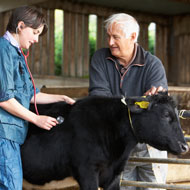RUMA revise cattle antimicrobial guidelines

The new revisions stress the need to manage farms to reduce disease challenge and minimise antimicrobial use.
The Responsible Use of Medicines in Agriculture Alliance (RUMA) has revised its guidelines on the Responsible Use of Antimicrobials in Cattle Production.
The new revisions, updated with extensive help from the British Cattle Veterinary Association, stress the need to manage farms to reduce disease challenge and minimise antimicrobial use.
They also include practical advice and highlight the Four Golden Rules of Disease Control:
• Biosecurity to limit disease spread
• Avoid stress
• Good hygiene
• Good nutrition
RUMA guidelines were first introduced in 2000 and are intended as working documents. Now in its 3rd edition, the short version provides quick and easy guiding principles that can be used by farmers, while the longer version is aimed primarily as veterinary surgeons and other advisors to provide more detail.
RUMA say that the holistic approach set out by the Four Golden Rules helps reduce the need to use antimicrobials, including antibiotics, without adversely affecting animal welfare. They add that it is important to reduce the risk of antibiotic resistance without reducing the availability of necessary antibiotics.
The new cattle guidelines are available free of charge on the RUMA website.



 HMRC has invited feedback to its communications regarding the employment status of locum vets and vet nurses.
HMRC has invited feedback to its communications regarding the employment status of locum vets and vet nurses.